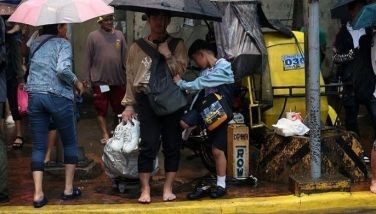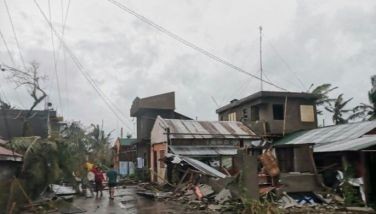YEARENDER: Peace talks between gov’t, Reds remain elusive
MANILA, Philippines - Peace with the Communist Party of the Philippines (CPP) and its armed wing New People’s Army (NPA) and political umbrella National Democratic Front (NDF) has remained elusive for President Aquino’s four-year-old administration.
Despite recent developments that gave some encouraging signs, there is no clear indication that the suspended peace talks between the government and the CPP will ever push through before Aquino steps down in 2016.
The negotiations between the government and the CPP broke down in February 2013. The government cited lack of sincerity and political will on the part of the CPP.
While expressing readiness to resume the peace talks, Presidential Adviser on the Peace Process Teresita Quintos-Deles said that the resumption of the peace talks should be on the basis of “doable and time-bound agenda.”
CPP founding Chairman Jose Ma. Sison said the government and the CPP may return to the negotiating table on the second week of January after the visit of Pope Francis.
Sison noted that a comprehensive agreement on economic reforms, truce and cooperation could still be accomplished before Aquino finishes his term should the government and the Office of the Presidential Adviser on the Peace Process (OPAPP) be fair in the negotiation.
But Deles said that while “friends of the peace process have been shuttling between the two panels to explore possible parameters for restarting talks at the earliest time possible,” there have been “no meetings between the government and the NDF to discuss the possible resumption of talks.”
“So far, feedback has been positive but there remain matters to be clarified in order to ensure that, if ever we do resume talks, it will not go the same way of an early, major impasse that has happened too often in the past,” she added.
Deles also said that in keeping with the spirit and hope of the Christmas season, she would like to think that Sison’s very positive remark indicates that common ground between the two parties may indeed be broadened towards the achievement of a just and durable peace that the Filipino people desire and deserve.
For his part, government peace panel chairman Alexander Padilla asked the CPP to transcend ideological boundaries and respond positively to the people’s yearning for peace.
Padilla noted that history has shown that it is through earnest dialogue, not armed violence, that peace is created.
“We have asked them to engage in talks that have a clear agenda and timetable, to talk not just for the sake of talking, but to reach specific agreements that will lessen if not eradicate the violence on the ground,” Deles added.
The NPA showed a goodwill gesture to promote the peace negotiations with the release of its captive personnel of the Philippine National Police (PNP) last July 30 after days of intense negotiations initiated by NDF-Mindanao spokesman Jorge Madlos.
The policemen were picked up in a mountainous barangay in Agusan del Norte by a group of multi-religious leaders who served as third party negotiators for the release of the captives.
The NPA had abducted four policemen when they attacked a police outpost in a remote area in Surigao del Norte earlier this year.
For the purpose of the release, the Armed Forces of the Philippines and the NPA agreed to separately issue a Suspension of Military Offensives (SOMO) to their respective forces for a period of five days from July 27 to Aug. 1.
Deles said the outburst of intense relief and joy at the reunion of the freed police officers with their families, all with very young children, was the immediate and heartfelt reward for everyone’s efforts.
In releasing the captive policemen, the NPA announced that they had taken this action as a goodwill gesture.
“We welcome this message from the NPA. In the face of the difficult challenges that have confronted this particular peace table, the government has remained firm in its commitment to pursue a peaceful resolution to this long drawn-out armed conflict,” Deles said.
However, Padilla questioned the CPP’s sincerity because its call for the resumption of peace talks was made only through media and not through the proper channels.
He said the proper approach would have been for the CPP to inform the Norwegian government, the third party facilitator of the peace negotiations since 2004. But “there has been no formal notification to the government up until today.”
However, the arrest of NDF leaders Benito and Wilma Tiamzon on March 22 also added to the question of sincerity, this time on the part of the government.
NDF leaders Randall Echanis and Rafael Baylosis complained they were prohibited from visiting the Tiamzon couple at the PNP Custodial Center.
The government denied the allegations. Padilla explained that the PNP duty officer that day clarified that as a matter of standard operating procedure, they need at least one week to process requests for visits.
He noted that while visits are given the highest priority for immediate relatives, counsels and doctors, all others who do not fall under these categories have to undergo the usual scrutiny and process, which require an application submitted days in advance.
“Echanis and Baylosis handed their request letter signed by SELDA only on the day of their visit. In light of this, the PNP regretfully informed Echanis and Baylosis that they could not favorably grant the request and they were advised to reschedule their visit,” he said.
A month before the Tiamzon couple were arrested, NDF consultant Ramon Patriarca was released from jail, following the decision of the Danao City regional trial court in Cebu to dismiss the case against him.
Patriarca was arrested in February 2009 by joint elements of the police and the 78th Infantry Battalion in Barangay Casili, Consolacion town in Northern Cebu. He was charged with rebellion.
But the NDF maintained that Patriarca was one of its consultants in the peace negotiation.
- Latest
- Trending




























